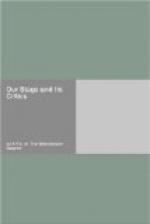We cannot tell just what is meant by the word “Spirit,” for we have nothing with which to describe it. But we can think of it as meaning the “essence” of Life and Being—the Reality underlying Universal Life.
Of course no name can be given to this One, that will fitly describe it. But we have used the term “The Absolute” in our previous lessons, and consider it advisable to continue its use, although the student may substitute any other name that appeals to him more strongly. We do not use the word God (except occasionally in order to bring out a shade of meaning) not because we object to it, but because by doing so we would run the risk of identifying The Absolute with some idea of a personal god with certain theological attributes. Nor does the word “Principle” appeal to us, for it seems to imply a cold, unfeeling, abstract thing, while we conceive the Absolute Spirit or Being to be a warm, vital, living, acting, feeling Reality. We do not use the word Nature, which many prefer, because of its materialistic meaning to the minds of many, although the word is very dear to us when referring to the outward manifestation of the Absolute Life.
Of the real nature of The Absolute, of course, we can know practically nothing, because it transcends all human experience and Man has nothing with which he can measure the Infinite. Spinoza was right when he said that “to define God is to deny him,” for any attempt to define, is, of course an attempt to limit or make finite the Infinite. To define a thing is to identify it with something else—and where is the something else with which to identify the Infinite? The Absolute cannot be described in terms of the Relative. It is not Something, although it contains within itself the reality underlying Everything. It cannot be said to have the qualities of any of its apparently separated parts, for it is the all. It is all that really is.




